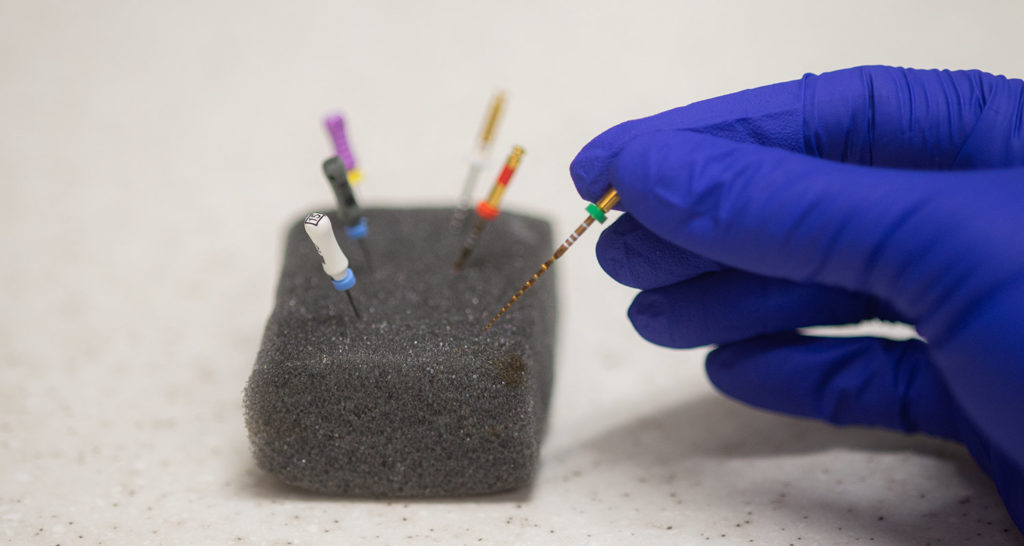Root Canal Specialist Near Me
Root canal is a procedure in which an extremely diseased or infected tooth is saved. This procedure is used as a last resort option if the dentist finds that there’s no other way to save your tooth. If you don’t act quickly and consult a dentist, the infection can completely destroy your tooth and spread to other teeth, which can put them at risk as well. At URBN Dental Midtown and Uptown, we do everything we can to save your teeth and only use the root canal as a final option.
What is a Root Canal?
Root canal treatment can repair or protect an extremely damaged, infected, or diseased tooth. During this procedure, the pulp, i.e., the damaged area of the tooth, is excavated and removed. After the removal, it’s cleaned, disinfected, and sealed again. It’s important to remove all of the pulp as this is where the bacteria start infesting, and leaving them in the teeth can lead to abscess formation. Your teeth may get infected for several reasons — due to dental decay, cavities, or an infection caused by trauma. After the root canal treatment, the tooth will remain in place. However, it won’t be able to distinguish between hot and cold due to the lack of a root nerve.

Warning Signs You Need a Root Canal
The necessity for a root canal doesn’t just pop up out of thin air. In all likelihood, the need for a root canal will be preceded by several symptoms and warning signs. If you watch out for these signs and visit a walk-in dentist promptly, you can completely avoid a root canal treatment.
The following are some of the signs and root canal symptoms you need to watch out for:
- The infected tooth will cause immense toothache. The toothache will be persistent and it will only get worse with time.
- Your breath will always smell foul and stale, no matter how much you brush your teeth or rinse with mouthwash. This is because of the presence of bacteria in your mouth.
- You may experience sharp pains while eating or chewing due to the formation of dental abscesses. There might come a time when you actively avoid chewing from certain parts of your mouth to avoid the sharp pain.
- Your teeth will become increasingly sensitive to hot and cold sensations.
- Swelling around the gum is a strong indicator of infections, gum disease, or some other issues. Swelling usually occurs due to the presence of pus or purulence around the teeth, which is indicative of a later stage disease.
- Your gums may become extremely sensitive and start bleeding when pressure is applied.
- You may also lose your ability to swallow or speak properly.
What is a Root Canal Procedure?
The following steps will take you through the entire root canal process from diagnosis to treatment:
- The dentist conducts an x-ray examination to accurately diagnose the disease and come up with a treatment plan.
- A rubber dam is attached to the tooth in order to protect it from saliva to prevent bacterial infection.
- The dentist first numbs the tooth so you don’t feel much pain or discomfort.
- An opening will be made through the crown of the tooth and straight into the pulp chamber.
- The dentist will use special files to excavate and clean out all of the infected and unhealthy pulp.
- The canal — now free from the infected pulp — will be sculpted to receive the filling material. An irrigation process will be used to remove debris and clean the canal.
- The doctor will get a tooth crown sculpted for your teeth. However, until the crown is prepared, the gap will be sealed with a temporary filling material. Once the crown is prepared, it will be placed over the tooth so that it looks and feels like a real tooth.
- In some cases, additional support will have to be placed in the form of a post.
- Finally, the crown will be cemented into place. This will restore your tooth to its original form — some may recover quickly whereas some may take a few weeks or even months.

Why Do You Need a Root Canal?
Sometimes, the pulp gets infected with dental decay around the teeth which leads to a dental abscess. This may occur because of a simple cavity or dental decay, but then it quickly progresses and becomes dangerous. If the pulp is left in the teeth, the infection may spread to the rest of the teeth and gums, putting them all under serious risk.
In some cases, if you don’t treat the rotten tooth in time, it may become impossible to save. In this case, the Houston Uptown dentist will have to extract the tooth completely. However, a good dental clinic will be able to offer a number of solutions to replace the extracted tooth. You can opt for a dental bridge or dental implants.
How Soon Should I Seek Help in Case of a Dental Emergency?
Unless you are a dental professional yourself, you cannot tell whether a certain delay can result in unacceptable damage or not. Therefore, act without delay. Even a small delay can result in serious, irreversible loss. Broken teeth cannot be grown again. Rush to your dentist for a physical examination, or if that is not possible in a short time, contact one on the telephone to seek advice. After listening to your description, your dentist may advise you to act immediately or give you an appointment.
Root Canal After Care
A treated tooth can last a lifetime without any other issues, but only if you take care of it. The following are some aftercare tips to follow:
- Brush your teeth twice a day and floss after every meal.
- Don’t chew on hard objects or food like ice and don’t use your teeth to open bottles and cans.
- Candies and sweets increase your likelihood of bacterial infections so you should limit your sweet consumption as much as possible.
- Go for regular dental cleaning appointments so your dental hygienist can prevent plaque and tartar accumulation in your teeth.
- If you experience symptoms like toothaches or bad breath, visit your dentist immediately because they can be caused by deeper underlying issues.
- If your dentist tells you that you are suffering from infections or cavities, then follow their recommendations and seek the necessary treatment. It’s a lot better to treat diseases in their initial stages rather than letting them fester.




